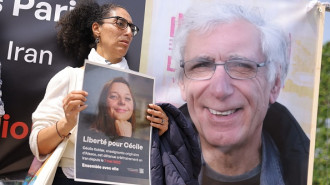Dozens of Egyptian commandos buried under Israeli tourist park: reports
Dozens of Egyptian commandos killed in the 1967 Arab-Israeli war are buried under an Israeli tourist attraction, according to Israeli-based media.
The commandos were buried side by side, in the soil of the Kibbutz Nahshon – a former no-mans-land cultivated by the Israeli Kibbutz community - where they remain under land now used by the Mini Israel park, Haaretz reported.
The war is known as Al-Naksa - ‘the setback’ - by Arabs, due to the scale of defeat suffered by Arab states and its lasting effect on the Arab population.
Individuals at the highest levels of Israeli government and army forces were reportedly unaware of the scale of the mass grave due to decades long censorship, interviews by Haaretz and the Akevot Institute for Israeli-Palestinian Conflict Research revealed.
“It’s not right that they are still buried there and that we turned the plots of land into a full-fledged agricultural area. This story distresses and haunts me” Dan Meir, a member of Kibbutz Nahshon said in the 1990’s in a censored, unpublished interview.
Similar sentiments were expressed by other Kibbutz members – including the late Binyamin Naor - in unpublished interviews, according to Haaretz.
“I am certain that if Jews were buried like that, we would cry out to the heavens,” Naor had said.
During the war, a Jordanian Legion was stationed in the West Bank’s Latrun enclave and was joined by an Egyptian commando unit – consisting of around 100 elite soldiers - from the army’s 33rd Battalion.
Egypt reportedly planned to capture air bases at Lod, Tel Nof and Ramle however, the commander of the Israeli 4th Brigade ordered the capture of the enclave, as fighting on the second day of the war resulted in around 80 Egyptian fatalities, Haaretz reported.
The 4th brigade unit proceeded to dig a 20-metre-long grave for the large number of Egyptians’ bodies.
Egyptian casualties during the war numbered more than 11,000, according to the Britannica Group.
The Mini Israel park was opened on the land since the early 2000’s and showcases “nearly all of the important archaeological, historical and religious sites in Israel”, according to travel site iTravel Jerusalem.
In 1979, Egypt signed a peace treaty with Israel, under which Israeli-captured Sinai was returned to Egypt in exchange





 Follow the Middle East's top stories in English at The New Arab on Google News
Follow the Middle East's top stories in English at The New Arab on Google News

![The law could be enforced against teachers without prior notice [Getty]](/sites/default/files/styles/image_330x185/public/2178740715.jpeg?h=a5f2f23a&itok=xMdFOAIF)
